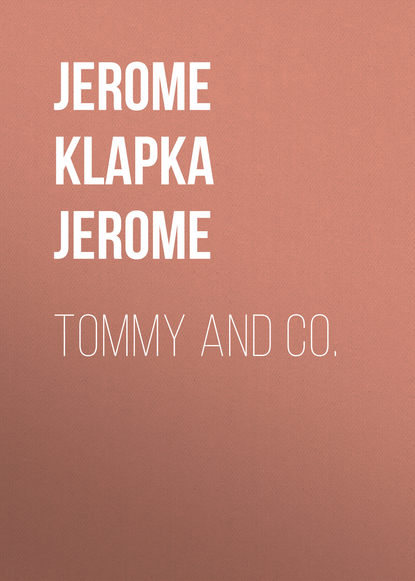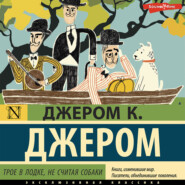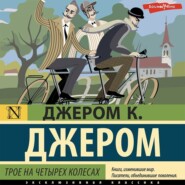По всем вопросам обращайтесь на: info@litportal.ru
(©) 2003-2024.
✖
Tommy and Co.
Настройки чтения
Размер шрифта
Высота строк
Поля
“She has – remarkably firm douch!” shouted the doctor into Peter’s ear. “Will see you – evening. Someting – say to you.”
The fat little doctor took his hat and departed. Tommy, ceasing suddenly, came over and seated herself on the arm of Peter’s chair.
“Feeling grumpy?” asked Tommy.
“It isn’t,” explained Peter, “that I mind the noise. I’d put up with that if I could see the good of it.”
“It’s going to help me to get a husband, dad. Seems to me an odd way of doing it; but Billy says so, and Billy knows all about everything.”
“I can’t understand you, a sensible girl, listening to such nonsense,” said Peter. “It’s that that troubles me.”
“Dad, where are your wits?” demanded Tommy. “Isn’t Billy acting like a brick? Why, he could go into Fleet Street to half a dozen other papers and make five hundred a year as advertising-agent – you know he could. But he doesn’t. He sticks to us. If my making myself ridiculous with that tin pot they persuaded him was a piano is going to please him, isn’t it common sense and sound business, to say nothing of good nature and gratitude, for me to do it? Dad, I’ve got a surprise for him. Listen.” And Tommy, springing from the arm of Peter’s chair, returned to the piano.
“What was it?” questioned Tommy, having finished. “Could you recognise it?”
“I think,” said Peter, “it sounded like – It wasn’t ‘Home, Sweet Home,’ was it?”
Tommy clapped her hands. “Yes, it was. You’ll end by liking it yourself, dad. We’ll have musical ‘At Homes.’”
“Tommy, have I brought you up properly, do you think?”
“No dad, you haven’t. You have let me have my own way too much. You know the proverb: ‘Good mothers make bad daughters.’ Clodd’s right; you’ve spoilt me, dad. Do you remember, dad, when I first came to you, seven years ago, a ragged little brat out of the streets, that didn’t know itself whether ’twas a boy or a girl? Do you know what I thought to myself the moment I set eyes on you? ‘Here’s a soft old juggins; I’ll be all right if I can get in here!’ It makes you smart, knocking about in the gutters and being knocked about; you read faces quickly.”
“Do you remember your cooking, Tommy? You ‘had an aptitude for it,’ according to your own idea.”
Tommy laughed. “I wonder how you stood it.”
“You were so obstinate. You came to me as ‘cook and housekeeper,’ and as cook and housekeeper, and as nothing else, would you remain. If I suggested any change, up would go your chin into the air. I dared not even dine out too often, you were such a little tyrant. The only thing you were always ready to do, if I wasn’t satisfied, was to march out of the house and leave me. Wherever did you get that savage independence of yours?”
“I don’t know. I think it must have been from a woman – perhaps she was my mother; I don’t know – who used to sit up in the bed and cough, all night it seemed to me. People would come to see us – ladies in fine clothes, and gentlemen with oily hair. I think they wanted to help us. Many of them had kind voices. But always a hard look would come into her face, and she would tell them what even then I knew to be untrue – it was one of the first things I can recollect – that we had everything we wanted, that we needed no help from anyone. They would go away, shrugging their shoulders. I grew up with the feeling that seemed to have been burnt into my brain, that to take from anybody anything you had not earned was shameful. I don’t think I could do it even now, not even from you. I am useful to you, dad – I do help you?”
There had crept a terror into Tommy’s voice. Peter felt the little hands upon his arm trembling.
“Help me? Why, you work like a nigger – like a nigger is supposed to work, but doesn’t. No one – whatever we paid him – would do half as much. I don’t want to make your head more swollen than it is, young woman, but you have talent; I am not sure it is not genius.” Peter felt the little hands tighten upon his arm.
“I do want this paper to be a success; that is why I strum upon the piano to please Clodd. Is it humbug?”
“I am afraid it is; but humbug is the sweet oil that helps this whirling world of ours to spin round smoothly. Too much of it cloys: we drop it very gently.”
“But you are sure it is only humbug, Tommy?” It was Peter’s voice into which fear had entered now. “It is not that you think he understands you better than I do – would do more for you?”
“You want me to tell you all I think of you, and that isn’t good for you, dad – not too often. It would be you who would have swelled head then.”
“I am jealous, Tommy, jealous of everyone that comes near you. Life is a tragedy for us old folks. We know there must come a day when you will leave the nest, leave us voiceless, ridiculous, flitting among bare branches. You will understand later, when you have children of your own. This foolish talk about a husband! It is worse for a man than it is for the woman. The mother lives again in her child: the man is robbed of all.”
“Dad, do you know how old I am? – that you are talking terrible nonsense?”
“He will come, little girl.”
“Yes,” answered Tommy, “I suppose he will; but not for a long while – oh, not for a very long while. Don’t. It frightens me.”
“You? Why should it frighten you?”
“The pain. It makes me feel a coward. I want it to come; I want to taste life, to drain the whole cup, to understand, to feel. But that is the boy in me. I am more than half a boy, I always have been. But the woman in me: it shrinks from the ordeal.”
“You talk, Tommy, as if love were something terrible.”
“There are all things in it; I feel it, dad. It is life in a single draught. It frightens me.”
The child was standing with her face hidden behind her hands. Old Peter, always very bad at lying, stood silent, not knowing what consolation to concoct. The shadow passed, and Tommy’s laughing eyes looked out again.
“Haven’t you anything to do, dad – outside, I mean?”
“You want to get rid of me?”
“Well, I’ve nothing else to occupy me till the proofs come in. I’m going to practise, hard.”
“I think I’ll turn over my article on the Embankment,” said Peter.
“There’s one thing you all of you ought to be grateful to me for,” laughed Tommy, as she seated herself at the piano. “I do induce you all to take more fresh air than otherwise you would.”
Tommy, left alone, set herself to her task with the energy and thoroughness that were characteristic of her. Struggling with complicated scales, Tommy bent her eyes closer and closer over the pages of Czerny’s Exercises. Glancing up to turn a page, Tommy, to her surprise, met the eyes of a stranger. They were brown eyes, their expression sympathetic. Below them, looking golden with the sunlight falling on it, was a moustache and beard cut short in Vandyke fashion, not altogether hiding a pleasant mouth, about the corners of which lurked a smile.
“I beg your pardon,” said the stranger. “I knocked three times. Perhaps you did not hear me?”
“No, I didn’t,” confessed Tommy, closing the book of Czerny’s Exercises, and rising with chin at an angle that, to anyone acquainted with the chart of Tommy’s temperament, might have suggested the advisability of seeking shelter.
“This is the editorial office of Good Humour, is it not?” inquired the stranger.
“It is.”
“Is the editor in?”
“The editor is out.”
“The sub-editor?” suggested the stranger.
“I am the sub-editor.”
The stranger raised his eyebrows. Tommy, on the contrary, lowered hers.
“Would you mind glancing through that?” The stranger drew from his pocket a folded manuscript. “It will not take you a moment. I ought, of course, to have sent it through the post; but I am so tired of sending things through the post.”
The stranger’s manner was compounded of dignified impudence combined with pathetic humility. His eyes both challenged and pleaded. Tommy held out her hand for the paper and retired with it behind the protection of the big editorial desk that, flanked on one side by a screen and on the other by a formidable revolving bookcase, stretched fortress-like across the narrow room. The stranger remained standing.
“Yes. It’s pretty,” criticised the sub-editor. “Worth printing, perhaps, not worth paying for.”
“Not merely a – a nominal sum, sufficient to distinguish it from the work of the amateur?”

















